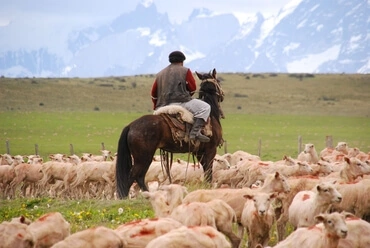Shepherd

Shepherds represent people who lead and teach others, using knowledge and true ideas to help people reach the goodness of life. This makes sense if you think about what a shepherd does. He makes sure the flock has good grass to eat; plants in the Bible represent facts and knowledge. The shepherd makes sure the flock has good water to drink; water represents true thinking about the spiritual aspect of day-to-day life. He carries weapons (a true understanding of spiritual things) to ward off predators (desires for evil) and keeps the flock safe. And the ultimate goal of the shepherd is for the flock to be useful, to do good, to provide good things, representing the good of life. There are, of course, a few cases in which shepherds are the bad guys (for instance, a group of them in Midian would chase Jethro's daughters away so they could water their sheep first; Moses found favor by helping the daughters and ended up marrying one of them). In these cases shepherds represent people who lead and teach without the good of life as the goal. When goodness is not the goal, ideas and knowledge are twisted into falsity and the teaching and leading trend toward evil. See also Sheep.
Arcana Coelestia # 367
367. Apart from showing that charity is the 'brother' of faith and that 'field' means all that comprises doctrine, there is no need to confirm these considerations from similar usages in the Word. That charity is the brother of faith may be clear to anyone from the very nature or essence of faith. The brother relationship between these two was also represented by Esau and Jacob, and was the reason why they struggled for the birthright and the superior position this carried with it. The relationship was also represented by Perez and Zerah, the sons Tamar had by Judah, Genesis 38:28-30, where again the question of primogeniture arises. It was represented by Ephraim and Manasseh as well, Genesis 48:13-14, wherein a similar way the matter of the birthright and the higher position it carried occurs. And there are many other examples. Indeed these two, faith and charity, are both the offspring of the Church. Faith is called 'a man' (vir), as Cain is in verse 1 of this chapter, while charity is called 'a brother', as in Isaiah 19:2; Jeremiah 17:14 and in other places. In Amos 1:9 the union of faith and charity is called 'a covenant between brothers'.
[2] As has been stated, that which Jacob and Esau represented was similar to the meaning of Cain and Abel. The fact that Jacob in a similar manner wished to supplant Esau is also clear in Hosea,
He will make a visitation on Jacob over his ways and requite him according to his deeds; in the womb he supplanted his brother. Hosea 12:2-3.
But the fact that Esau, that is, charity represented by Esau, would nevertheless be the superior is clear from the prediction made through their father Isaac,
By your sword will you live, and you will serve your brother; but when you have dominion over him you will cast away his yoke from above your neck. Genesis 27:40.
Or what amounts to the same, a gentile or new Church is represented by Esau, and the Jewish Church by Jacob. This is why it was stated so many times that they were to recognize gentile nations as brothers. Charity was also the reason for everyone being referred to as 'a brother' in the gentile or Primitive Church, and for the Lord calling 'brothers' those who hear the Word and do it, Luke 8:21. Hearers of it are those who have faith, doers those who have charity. But those who are hearers, that is, say they have faith, but are not doers, that is, have no charity, are not brothers, for the Lord likens them to the foolish, Matthew 7:24, 26.






